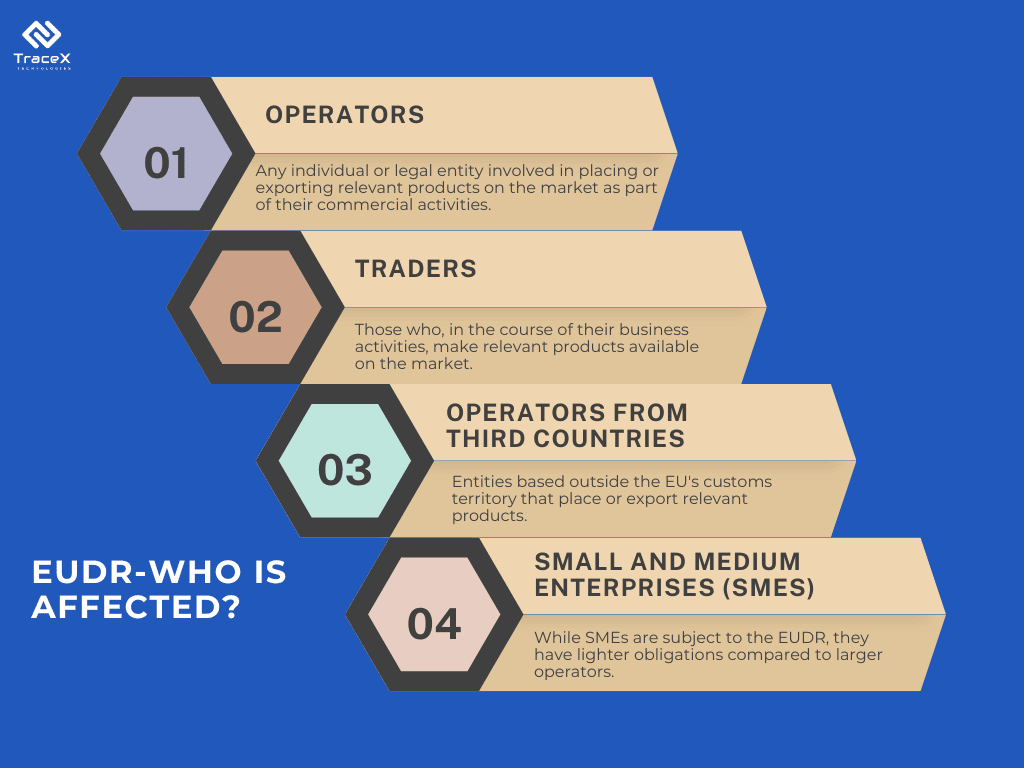Contact: +91 99725 24322 |
Menu
Menu
Quick summary: Explore the serious consequences of EUDR non-compliance, including financial penalties, operational disruptions, and reputational damage. Learn how robust traceability systems and proactive regulatory engagement can help businesses avoid these risks and strengthen their sustainability practices.

Businesses face a new wave of regulatory scrutiny with EUDR bringing with it significant risks and penalties for non-compliance. The stakes are high: failing to meet EUDR requirements can result in severe financial penalties, damage to reputation, and disruption to supply chains. As the EUDR enforces stricter standards, grasping the implications of EUDR penalties becomes crucial for any organization committed to ethical and sustainable practices.
Understanding these penalties is crucial for businesses. The challenge lies in understanding and navigating these potential penalties to safeguard your business against costly repercussions.
Article 25 of the regulation talks about the stringent penalties for non-compliance, ranging from substantial fines to market exclusion. Effective communication within the supply chain is crucial for gathering accurate information and ensuring products meet EUDR standards.
The EUDR mandates that products imported into or produced within the EU must not come from deforested land or land that has undergone significant degradation since December 31, 2020. The regulation applies to a range of commodities, including soy, palm oil, coffee, cocoa, and wood. To comply, businesses must ensure traceability and provide evidence that their products are not linked to deforestation activities.
Non-compliance with the EUDR can result in various penalties, each with significant implications for businesses. Authorities have the power to enforce a variety of sanctions, including:
Additionally, fines for non-compliance can reach up to 4% of the previous year’s total annual turnover across the EU. If necessary, fines can be adjusted to surpass the economic benefit gained from the breach.
These penalties can be broadly categorized into financial penalties, operational consequences, and reputational damage.
The primary financial penalty for EUDR non-compliance is the imposition of fines. The size of these fines can vary depending on the severity of the non-compliance and the size of the business. For larger corporations, fines can reach millions of euros, while smaller businesses might face proportionally lower penalties. In addition to fines, businesses may face administrative penalties. These can include suspension of trading licenses, increased scrutiny from regulatory authorities, and additional compliance costs. Non-compliant businesses will need to invest in remediation efforts to meet EUDR requirements. This can involve implementing new traceability systems, conducting audits, and revising supply chain practices. Businesses may incur significant legal fees if they challenge fines or regulatory decisions. This adds to the overall cost of non-compliance.
Non-compliance can lead to suspension of trade activities within the EU. This means that businesses may be barred from selling their products in one of the world’s largest markets, impacting revenue and growth opportunities. Businesses found to be non-compliant may face barriers to accessing other international markets, as they may be required to demonstrate compliance with similar regulations elsewhere. To rectify non-compliance, businesses might need to overhaul their supply chains. This can include finding new suppliers, modifying procurement practices, and implementing more rigorous traceability measures. Addressing compliance issues can lead to operational downtime, affecting production schedules and delivery timelines.
Non-compliance with the EUDR can severely damage a brand’s reputation. Consumers increasingly value sustainability and may choose to boycott products from companies that do not adhere to environmental regulations. Businesses may face negative publicity from media coverage and public scrutiny, further eroding consumer trust and brand value. Investors are increasingly considering environmental, social, and governance (ESG) factors when making investment decisions. Non-compliance with the EUDR can lead to a loss of investor confidence and reduced investment opportunities. Companies may face pressure from shareholders and activists who demand greater transparency and adherence to environmental standards.

1. Implement Robust Traceability Systems
Businesses should invest in advanced traceability technologies, such as blockchain and digital platforms, to ensure accurate tracking of products and supply chain activities. Conduct regular audits of supply chains to identify and address potential compliance issues before they result in penalties.
2. Enhance Supplier Engagement
Provide training and support to suppliers to ensure they understand and comply with EUDR requirements. Include EUDR compliance clauses in supplier agreements to enforce adherence to environmental standards.
3. Stay Informed and Updated
Stay informed about changes in EUDR regulations and requirements. Subscribe to industry newsletters and attend relevant conferences to keep abreast of regulatory developments. Engage with legal and compliance experts to navigate the complexities of EUDR compliance and address any challenges.
Technology solutions play a crucial role in helping companies avoid EUDR penalties by streamlining compliance processes, enhancing data accuracy, and ensuring transparency.
By leveraging these technology solutions, companies can effectively navigate the complexities of EUDR compliance, minimizing the risk of penalties and ensuring a smooth, compliant operation.
The TraceX EUDR Compliance Platform is designed to mitigate the risk of penalties by providing comprehensive support for adherence to the EU Deforestation Regulation. This advanced platform integrates real-time monitoring, automated reporting, and end-to-end traceability to ensure that companies meet all regulatory requirements. By utilizing TraceX’s blockchain technology, businesses gain transparent, immutable records of their supply chain, enabling accurate verification of compliance. The platform’s automated systems continuously track and assess potential non-compliance issues, providing timely alerts and facilitating corrective actions before penalties arise. With streamlined documentation and robust data management capabilities, TraceX simplifies the complex compliance process, allowing companies to focus on sustainable practices while confidently avoiding the risk of significant fines and operational disruptions.
The EUDR represents a significant shift in regulatory expectations for businesses operating within the EU. Non-compliance with the EUDR can result in substantial financial penalties, operational disruptions, and severe reputational damage. To avoid these penalties, businesses must implement robust traceability systems, engage with suppliers, and stay informed about regulatory changes. By proactively addressing EUDR requirements, companies can not only avoid penalties but also enhance their sustainability practices and strengthen their market position.
